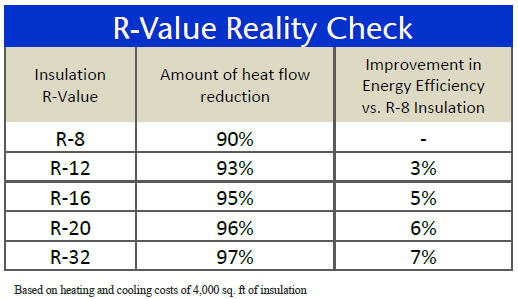Garage Door R-Values
What is an R-Value?
What is an R-Value?
The R-Value of a door measures how well it resists heat transfer to keep your garage warmer during the winter and cooler during the summer. Higher R-Values mean better insulation. Here are some examples of approximate R-Values:
- R=0 – Non-Insulated Steel Garage Door
- R=2 – Wood Garage Door
- R=6.5 – An 1-3/8″ thick polystyrene-insulated 3-layer Clopay-brand garage door
- R=8 – Blocks 90% of heat flow (see chart below)
- R=9 – A 2″ thick polystyrene-insulated 3-layer Clopay-brand garage door
- R=12 – Blocks 93% of heat flow (see chart below)
- R=12.9 – A 1-3/8″ thick polyurethane-insulated 3-layer Clopay-brand garage door
- R=13 – Fiberglass insulation in an exterior 2 x 4 wall of a house
- R=16 – Blocks 95% of heat flow (see chart below)
- R=18.4 – A 2″ thick polyurethane-insulated 3-layer Clopay-brand garage door
- R=20 – Blocks 96% of heat flow (see chart below)
The following chart was put out by Amarr, a major American garage door manufacturer:

So Which Level of R-Value Should You Choose?
There are many factors at play in choosing a garage door R-Value, including the setup of your house, your budget, and, of course, your insulation requirements. Here are our recommendations:
On detached or non-insulated garages: We recommend doing the least expensive 3-layer door (R-Value = approximately 6-6.5) for quality, strength, and durability – or a 1-layer (R-Value = 0) for maximum cost savings
To get a decent R-Value: R-Values in the range of 6-8 are decent, respectable R-Values that are leagues above non-insulated (R = 0) or wood (R = 2) doors. Don’t forget, the garage doors are only 1 small part of your total garage surface area that is exposed to the elements and there is also a barrier, most certainly insulated, between your garage and your living area. 2-layer doors from CHI and 1-3/8″ thick, 3-layer, polystyrene-insulated doors from most manufacturers will put you in this range.
If you want to take it up a level: Go with a 1-3/8″ thick polyurethane insulated door with an R-Value in the 12-12.9 range. This will roughly match the R-Value of your external walls and provide an even tougher door without going overboard on price. The price differential when compared to a polystyrene-insulated door is not huge. See our catalogs to check the difference.
If you find the price difference between the previously listed level and the top-of-range door to not be too significant: go for an R-Value in the range of 16-18.4 or even 19.4, using a 2″ thick polyurethane insulated door. This will give you an insulation value higher than 99.5% of all garage doors out there, superior strength, and ultimate peace of mind for situations where warmth and comfort are critical. The up-charge does depend on the type of door, the size of the door, and other factors.
